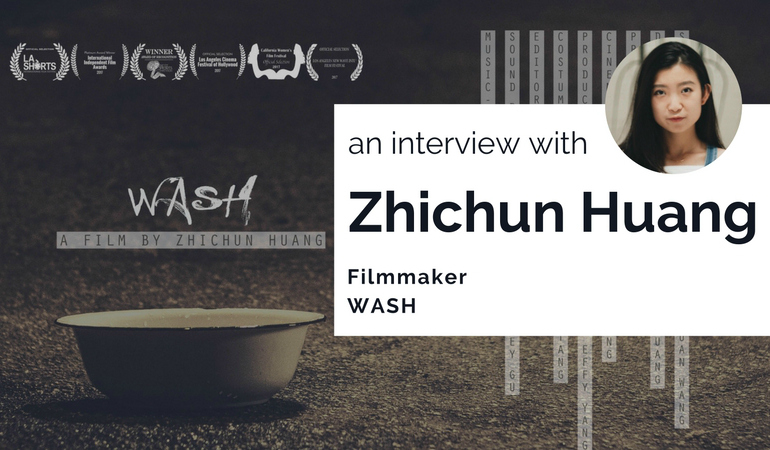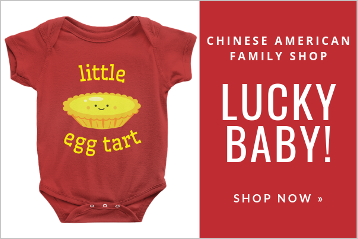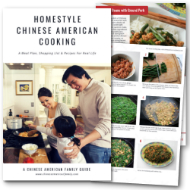This article is part of our Spotlight on Chinese American Artists. Sign up for our newsletter to receive family-friendly activity, recipe and craft ideas throughout the year!
This year’s Los Angeles Shorts International Film Festival (August 2-10, 2017) features a special Chinese American Filmmakers Showcase on its opening day program. I recently had the opportunity to sit down with Zhichun Huang, whose film WASH tells the story of a newly immigrated Chinese mother and daughter living in Los Angeles during California’s recent drought.
Zhichun Huang moved from China to the United States in 2009 for high school in Boston, before moving to California for college and graduating from the University Of California San Diego last year. She is currently a Los Angeles based independent filmmaker focusing on directing and screenwriting.
Richly textured and evocative, WASH (trailer) explores several dimensions of the contemporary immigrant experience in just under 15 minutes. Every detail, from clipped coupons to water slowly collecting in a wash basin, convey the emotions associated with an immigrant family’s cultural and linguistic assimilation, treasured traditions, innocence, despair and hope.
Zhichun shared her perspective about the immigrant experience, the strength of family relationships across time and distance and her approach for illuminating the Chinese American story. These are edited excerpts from our conversation.
See WASH at the Los Angeles Shorts International Film Festival’s Chinese American Filmmakers Showcase on August 2. The festival continues through August 10 and tickets are available at lashortsfest.com.
WASH examines the contemporary immigrant experience. Why did you pick a mother and daughter as your protagonists and how do their perspectives differ?
It comes from my family’s influence. I’ve remained strongly attached to my parents even though we haven’t had much time together since I came to the United States in 2009. I am particularly close to my mother — thanks to the Internet, we never grew apart, even though we are separated physically. She is a really strong, wise woman who did a lot to raise me and I thought that if I ever made a film of my own, I would dedicate it to her and our relationship.
The mother and daughter have different perspectives in the film. They’re both passing through a cultural threshold, but experiencing it differently. The mother is looking for jobs and facing a language barrier, while protecting her daughter, who is younger and picks up the culture and language more quickly.
I came to the United States as a teenager, so between the ages of the mother and daughter, but observed how this happens. When you come earlier, you pick up a new culture and identity faster and more easily. At an older age, your outlook on life has already been shaped and it’s more difficult.
How does your film contribute to the broader genre of stories about the Chinese American experience?
From my experience, I feel like most films about this topic try to use traditional, mainstream storytelling methods. Because I come from a visual arts background, rather than a film background, I’m not as limited to tell my story in a certain way. For instance, there’s minimal dialogue in the film. Instead, I tried to put information in all the film’s parts. The production design, color palettes and sound design are all about how the film can make the audience feel.
How does WASH contribute to contemporary perceptions of the Chinese American immigrant experience?
One of my goals was to bridge the gap between China and America. For the American audience, I wanted to raise the plight of a marginalized group and raise awareness to these social issues. For the Chinese audience, I wanted to show another side of immigrant life and hopefully break the idealized image of the American dream. Even those in China who have been to Western countries don’t necessarily know what it is like to live there. I’m trying to use my film to bridge this information gap.
How can families use a film like WASH in their own conversations about immigration, family relationships and culture?
I come from a loving family. As I grow up, I realize how hard it must have been for my mother to maintain her marriage, while giving me herself and her love. My Chinese identity and my study abroad experience both make me who I am. What I learned in the United States is how to express myself, my individualism and how to go for what I want. It’s about combining experience and the original culture to express what’s been learned.
Growing up, what films informed your view of Chinese American culture?
I only decided to makes films in my last year of college. I was an economics major, then switched to start making visual arts. One of my great influences who talked about immigrant life is Ang Lee with his films PUSHING HANDS, THE WEDDING BANQUET and EAT DRINK MAN WOMAN.
Help me build a family evening. What’s another film you would watch to complement WASH as a double feature?
One of my favorite filmmakers is a Japanese filmmaker named Hirokazu Koreeda, who is also deeply influenced by his family relationships. I would recommend all of his films — his most recent are AFTER THE STORM and OUR LITTLE SISTER.
Drawing on the characters’ homes in China and Los Angeles, what’s the meal that best pairs with WASH?
I would recommend hot pot or spicy food. I am a spicy food lover and can eat spicy food whenever!
###
Your turn! Do you want to watch WASH? What inspiration do you draw from Zhichun’s experience?





Leave a Reply